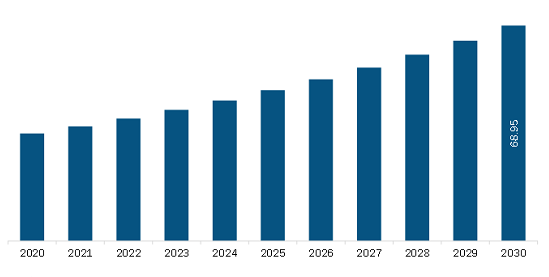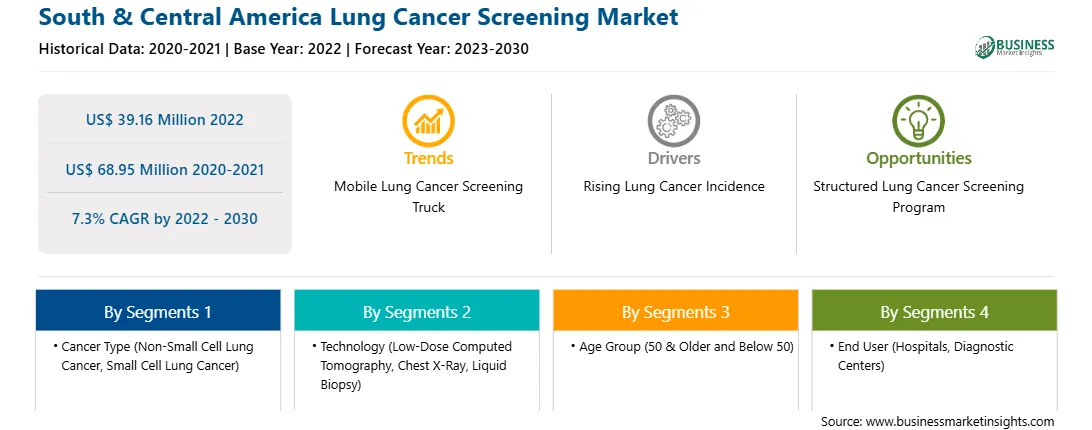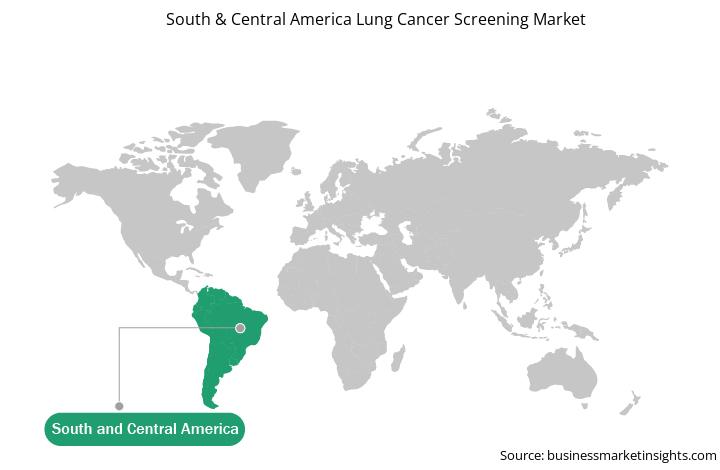Amid growing healthcare awareness in the region, lung cancer screening providers in the region has ample opportunities. These include collaborating with regional hospitals and clinics through which they can offer accessible lung cancer screening and leveraging telemedicine for remote areas. This approach not only detects lung cancer early but also improves patient outcomes, filling a crucial gap in the region’s healthcare. By aligning with the rising demand for preventive care, these providers can establish a foothold in a promising market, ultimately contributing to enhanced public health and well-being across the region.
The South & Central America lung cancer screening market is segmented into the Brazil, Argentina, and the Rest of South & Central America. The regional growth is attributed to various factors, such as the increasing incidence of lung cancer and growing awareness of lung cancer screening among people. Also, rising government support for screening has led to the further growth of the market.
The lung cancer screening market is being influenced by factors such as the increasing prevalence of cancer. For instance, as per Globocan 2020 report, lung cancer is Brazil's second most prevalent cancer. There were 88492 new cases of lung cancer found in Brazil.
Lung cancer screening is believed to be the standard of care worldwide. In Brazil, complications in its implementation related to the organization of the health system, access to CT scans and treatment methods, and cultural acceptance of the method restrict the process. There are challenges and barriers in carrying out the screening according to the local organization; however, it was possible to obtain satisfactory results in all scenarios.
According to Lung Cancer Policy Network, In Brazil, a coordinated approach to lung cancer screening is necessary, as health assistance is fragmented across the country and has resulted in significant health inequalities. The advantages of LDCT screening were recently described in the Second Brazilian Early Lung Cancer Screening Trial (BRELT2). Nevertheless, there are still many barriers to overcome before an organized screening program can be implemented nationwide, including inequitable access to screening equipment between public and private healthcare. To manage this challenge, as part of the Propulmão Mobile Project, the municipal health office in Barretos (São Paulo) collaborated with the local cancer hospital to deliver mobile LDCT screening and a smoking cessation intervention in the community.
Strategic insights for the South & Central America Lung Cancer Screening provides data-driven analysis of the industry landscape, including current trends, key players, and regional nuances. These insights offer actionable recommendations, enabling readers to differentiate themselves from competitors by identifying untapped segments or developing unique value propositions. Leveraging data analytics, these insights help industry players anticipate the market shifts, whether investors, manufacturers, or other stakeholders. A future-oriented perspective is essential, helping stakeholders anticipate market shifts and position themselves for long-term success in this dynamic region. Ultimately, effective strategic insights empower readers to make informed decisions that drive profitability and achieve their business objectives within the market. The geographic scope of the South & Central America Lung Cancer Screening refers to the specific areas in which a business operates and competes. Understanding local distinctions, such as diverse consumer preferences (e.g., demand for specific plug types or battery backup durations), varying economic conditions, and regulatory environments, is crucial for tailoring strategies to specific markets. Businesses can expand their reach by identifying underserved areas or adapting their offerings to meet local demands. A clear market focus allows for more effective resource allocation, targeted marketing campaigns, and better positioning against local competitors, ultimately driving growth in those targeted areas.
South & Central America Lung Cancer Screening Strategic Insights

South & Central America Lung Cancer Screening Report Scope
Report Attribute
Details
Market size in 2022
US$ 39.16 Million
Market Size by 2030
US$ 68.95 Million
Global CAGR (2022 - 2030)
7.3%
Historical Data
2020-2021
Forecast period
2023-2030
Segments Covered
By Cancer Type
By Technology
By Age Group
By End User
Regions and Countries Covered
South and Central America
Market leaders and key company profiles
South & Central America Lung Cancer Screening Regional Insights

South & Central America Lung Cancer Screening Market Segmentation
The South & Central America lung cancer screening market is segmented into cancer type, technology, age group, end user, and country.
Based on cancer type, the South & Central America lung cancer screening market is segmented into non–small cell lung cancer (NSCLC), and small cell lung cancer. The non–small cell lung cancer (NSCLC) segment held a larger share of the South & Central America lung cancer screening market in 2022.
Based on technology, the South & Central America lung cancer screening market is segmented into chest X-ray, low dose computed tomography (LDCT), liquid biopsy, and others. Chest X-ray segment held the largest share of the South & Central America lung cancer screening market in 2022.
Based on age group, the South & Central America lung cancer screening market is segmented into 50 and older, and below 50. 50 and older segment held the larger share of the South & Central America lung cancer screening market in 2022.
Based on end user, the South & Central America lung cancer screening market is segmented into hospital, diagnostic centre, and others. Hospital segment held the largest share of the South & Central America lung cancer screening market in 2022.
Based on country, the South & Central America lung cancer screening market is segmented into Brazil, Argentina, and the Rest of South & Central America. Brazil dominated the South & Central America lung cancer screening market in 2022.
Siemens AG, Koninklijke Philips NV, Canon Inc, Medtronic, and GE HealthCare technologies Inc are some of the leading companies operating in the South & Central America lung cancer screening market.
The South & Central America Lung Cancer Screening Market is valued at US$ 39.16 Million in 2022, it is projected to reach US$ 68.95 Million by 2030.
As per our report South & Central America Lung Cancer Screening Market, the market size is valued at US$ 39.16 Million in 2022, projecting it to reach US$ 68.95 Million by 2030. This translates to a CAGR of approximately 7.3% during the forecast period.
The South & Central America Lung Cancer Screening Market report typically cover these key segments-
The historic period, base year, and forecast period can vary slightly depending on the specific market research report. However, for the South & Central America Lung Cancer Screening Market report:
The South & Central America Lung Cancer Screening Market is populated by several key players, each contributing to its growth and innovation. Some of the major players include:
The South & Central America Lung Cancer Screening Market report is valuable for diverse stakeholders, including:
Essentially, anyone involved in or considering involvement in the South & Central America Lung Cancer Screening Market value chain can benefit from the information contained in a comprehensive market report.